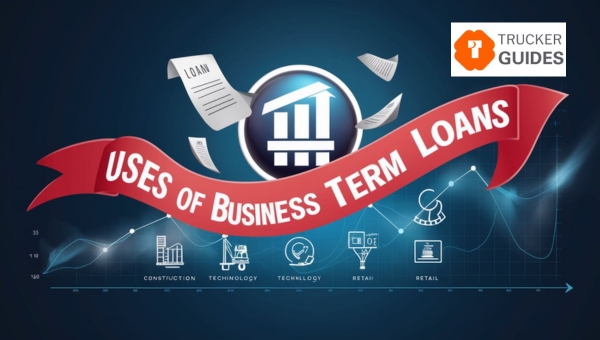The world of business financing can be overwhelming, but worry not! In this article, we’ll delve into Business Term Loans: A Guide to Financing, exploring what they are, how they work, their benefits, and the steps to qualify.
Whether you’re looking to expand your business, purchase new equipment, or boost your working capital, we’ve got you covered. Read on to unlock the secrets of business term loans and discover how they can fuel your business’s growth!
What Is a Business Term Loan?
A business term loan is a financial product designed to provide businesses with a lump sum of money that they repay over a set period.
This type of loan is ideal for businesses that need capital for various purposes, such as expansion or purchasing equipment. Let’s dive into the specific features and types of these loans.
Characteristics of Business Term Loans
Business term loans come with several key features that make them a popular choice for business financing. Here are some of the main characteristics:
- Fixed Repayment Schedule: Borrowers repay the loan in regular installments, which can be monthly, quarterly, or annually.
- Interest Rates: These can be either fixed or variable, impacting the total cost of the loan over time.
- Loan Amount: Typically, the amount ranges from $5,000 to several million dollars, depending on the lender and the borrower’s creditworthiness.
- Loan Term: The duration can vary widely, from one year to 25 years.
- Collateral: Some business term loans may require collateral, such as property or equipment, to secure the loan.
- Application Process: This involves submitting financial statements, business plans, and other relevant documents.
Types of Business Term Loans
There are different types of business term loans available to suit various business needs. Understanding these can help you choose the right one for your business:
- Short-Term Loans: These loans generally have terms of one year or less. They are suitable for immediate needs like covering cash flow gaps or small investments.
- Intermediate-Term Loans: Typically, these loans have terms ranging from one to three years. They are ideal for purchasing equipment or funding smaller expansion projects.
- Long-Term Loans: With terms ranging from three to 25 years, these loans are perfect for significant investments like real estate or large-scale business expansion.
- Secured Loans: These require collateral, reducing the lender’s risk and potentially offering lower interest rates.
- Unsecured Loans: These do not require collateral but may come with higher interest rates due to the increased risk for the lender.
- Fixed-Rate Loans: The interest rate remains constant throughout the loan term, making budgeting easier.
- Variable-Rate Loans: The interest rate can change over time, usually based on market conditions, which can affect the total repayment amount.
By understanding the characteristics and types of business term loans, you can make an informed decision that best suits your business needs.
Also Read: Self-Analysis Test [Unlock Your True Potential Today]
How Business Term Loans Work?
Understanding how business term loans work is crucial for any business looking to secure financing. These loans provide a set amount of money that must be repaid over a fixed period.
Let’s dive into some key reasons why businesses opt for these loans and examine their benefits and drawbacks.
- Predictable Repayment Schedule: Business term loans come with a fixed repayment schedule. This predictability helps businesses plan their finances more effectively.
- Large Funding Amounts: These loans generally offer substantial amounts, making them ideal for significant investments or expansions.
- Fixed Interest Rates: Many business term loans come with fixed interest rates, providing stability and helping businesses avoid fluctuating costs.
- Longer Repayment Terms: The repayment period for business term loans can range from a few years to several decades, allowing businesses to spread out their payments over a longer period.
- Build Business Credit: Successfully repaying a business term loan can improve your business credit score, making it easier to secure future financing.
Pros and Cons
Like any financial product, business term loans come with their own set of advantages and disadvantages. Here’s a detailed look at both:
Pros:
- Access to Large Sums: One of the biggest advantages is the ability to access large sums of money, crucial for significant business projects.
- Fixed Interest Rates: Fixed interest rates mean your repayment amount remains the same, making it easier to manage your budget.
- Flexible Terms: The terms of business term loans can be quite flexible, often ranging from one year to several years, depending on the lender and the business’s needs.
- Improvement in Credit Score: Regular and timely repayments can significantly improve your business credit score, opening doors to future financing options.
Cons:
- Qualification Requirements: Securing a business term loan often requires a solid credit history and comprehensive financial documentation, which can be challenging for new or smaller businesses.
- Collateral: Many business term loans require collateral, putting business assets at risk if repayments are not met.
- Long-term Commitment: Committing to long-term repayment schedules can be a burden, especially if the business’s financial situation changes.
- Interest Costs: Over the life of the loan, the total interest paid can be substantial, adding to the overall cost of the loan.
Also Read: 5 Best Bar POS Systems in [CY] [Top Picks Revealed]
Uses of Business Term Loans
Business term loans can be a powerful tool for businesses looking to grow, purchase essential equipment, or manage their working capital more effectively.
Let’s dive into how these loans can be utilized in various aspects of a business.
Business Expansion
Business term loans are highly beneficial for companies aiming to expand their operations. Expansion might involve:
- Opening New Locations: A loan can provide the necessary funds to open another store, office, or warehouse.
- Increasing Product Lines: Businesses can use the loan to develop and launch new products, thereby reaching a wider audience.
- Hiring More Staff: Hiring additional employees can help manage increased demand or improve service quality.
- Marketing Campaigns: Invest in advertising and marketing campaigns to boost brand awareness and sales.
With the right loan, businesses can seize growth opportunities that might otherwise be out of reach.
Equipment Purchase
Another significant use of business term loans is for purchasing equipment. This can be crucial for:
- Upgrading Machinery: Replacing outdated or inefficient machinery can improve productivity and reduce maintenance costs.
- Acquiring New Technology: Keeping up with technological advancements helps maintain a competitive edge.
- Fleet Expansion: For businesses that rely on vehicles, loans can help expand or modernize their fleet.
- Office Equipment: From computers to furniture, having the right tools can enhance employee efficiency and satisfaction.
By financing these purchases through a term loan, businesses can spread out the cost over time, making it more manageable.
Working Capital
Managing day-to-day operations smoothly often requires a boost in working capital. Business term loans can help in:
- Covering Operational Costs: Loans can ensure that there are enough funds to cover rent, utilities, and payroll.
- Inventory Management: Maintaining adequate inventory levels is crucial to meet customer demand without delays.
- Managing Cash Flow: A loan can provide a buffer during slow seasons or when waiting for customer payments.
- Emergency Funds: Having a financial cushion for unexpected expenses can prevent disruptions in operations.
Also Read: Cost for Payroll Services in [CY] [What You Need to Know]
How to Qualify for a Business Term Loan?
Qualifying for a business term loan can seem like a challenging process, but understanding the key steps can make it more manageable.
Let’s dive into the important aspects of qualifying, from checking your credit to the necessary documentation and collateral requirements.
Checking Your Credit
Your credit score plays a crucial role in qualifying for a business term loan. Lenders use your credit history to evaluate your reliability in repaying the loan.
- Credit Score: A higher credit score increases your chances of approval and may result in better loan terms.
- Credit Report: Review your credit report for errors. Correcting inaccuracies can improve your score.
- Credit History: Lenders prefer a long credit history with consistent, on-time payments.
Necessary Documentation
When applying for a business term loan, you’ll need to provide specific documents to support your application. These documents help lenders assess your business’s financial health and your ability to repay the loan.
- Business Plan: A detailed business plan outlining your business model, market analysis, and financial projections.
- Financial Statements: Recent financial statements, including income statements, balance sheets, and cash flow statements.
- Tax Returns: Business and personal tax returns for the past two to three years.
- Bank Statements: Recent business bank statements to show cash flow and financial stability.
- Legal Documents: Business licenses, articles of incorporation, and any other relevant legal documents.
Collateral Requirements
Collateral is an asset that you pledge to secure the loan. If you default on the loan, the lender can seize the collateral to recover the owed amount.
- Real Estate: Commercial or personal property can be used as collateral.
- Equipment: Business equipment and machinery.
- Inventory: Stock and inventory that can be liquidated.
- Accounts Receivable: Outstanding invoices that are yet to be paid by customers.
Also Read: Analog Phone System vs VoIP
Costs and Fees Associated with Business Term Loans
When it comes to business term loans, understanding the costs and fees is crucial. This information helps you make informed decisions and avoid unexpected expenses.
Let’s dive into the key aspects: interest rates and additional fees.
Interest Rates
Interest rates are a significant part of any loan, and business-term loans are no exception. They determine how much extra you’ll pay on top of the principal amount over the loan period.
Here are the different types of interest rates you might encounter:
- Fixed Interest Rates: These rates remain the same throughout the loan term, providing predictability in payments.
- Variable Interest Rates: These rates can fluctuate based on market conditions. While they may start lower than fixed rates, there’s a risk they could increase over time.
- Prime Rates: These rates are typically offered to the most creditworthy borrowers and are often lower. They are usually tied to the federal funds rate.
- APR (Annual Percentage Rate): This rate includes interest as well as any fees or other costs involved in procuring the loan, giving a more comprehensive view of the loan’s total cost.
Additional Fees
Besides interest rates, there are several other fees you should be aware of when taking out a business term loan. Understanding these can help you budget more accurately and avoid surprises:
- Origination Fees: These are upfront fees charged for processing the loan application. They are usually a percentage of the loan amount.
- Prepayment Penalties: Some loans come with fees for paying off the loan early. This is to compensate the lender for the interest they would miss out on.
- Late Payment Fees: If you miss a payment deadline, you may incur additional charges. It’s important to know these fees to avoid them.
- Maintenance Fees: Some lenders charge ongoing fees to manage the loan account. These can be monthly or annual charges.
- Application Fees: These are fees for submitting a loan application, regardless of whether the loan is approved or not.
Conclusion
Business term loans are a powerful tool for companies looking to grow, purchase equipment, or boost their working capital. They offer structured repayment plans and can significantly aid in achieving business goals. However, it’s essential to understand the terms, costs, and requirements before committing.
Make sure to explore all your options and consult with financial advisors to make the best decision for your business. If you found this guide helpful, don’t miss out on more informative articles on our site. Dive into our blog for more tips and insights on business financing!




